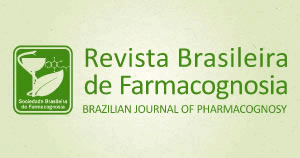The antispasmodic activity of Jatropha gossypiifolia L., Euphorbiaceae, aerial parts was investigated in rodents using the mouse intestinal transit model and acetylcholine (ACh, 10-9 to 10-4 M) and calcium (CaCl2, 10-4 to 10-1 M)-induced contractions of isolated rat jejunum. Similar to atropine (1 mg/kg), oral doses of ethanolic extract (EE) of J. gossypiifolia (500, 1000 and 2000 mg/kg) produced a decrease in intestinal transit (37.6 to 57.1%) when compared with control. The ACh-induced contraction in the jejunum was inhibited by EE (0.5, 1.0 and 2.0 mg/mL), chloroformic (CF) and aqueous fractions (0.1 and 0.5 mg/mL) and methanolic subfraction (0.05 and 0.25 mg/mL), suggesting an antimuscarinic mechanism. CaCl2 - induced responses in jejunum were also attenuated in the presence of CF (0.05 and 0.1 mg/mL) implying a direct interference of CF with the influx of calcium ions in the cells. Only the organic fraction of the extract had a calcium-antagonist effect, whereas both chloroformic and aqueous fractions had anticholinergic effect. These results suggest that the antispasmodic effect of J. gossypiifolia may be due a combination of anticholinergic and calcium antagonist mechanisms.
antimuscarinic mechanism; antispasmodic; calcium channel antagonist; Jatropha gossypiifolia






